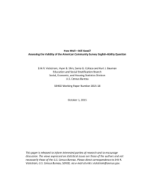How Well—Still Good? Assessing the Validity of the American Community Survey English-Ability Question
How Well—Still Good? Assessing the Validity of the American Community Survey English-Ability Question
Abstract
The “English-ability question” has been the U.S. Census Bureau’s principal survey item for assessing the population’s English proficiency since its appearance in the 1980 decennial census. This study is a first step in attempting to assess the continued validity of the English-ability item using data from the 2003 National Assessment of Adult Literacy (NAAL). We first attempt to assess the empirical comparability of the NAAL and the 2003 American Community Survey (ACS) by comparing the two surveys’ distributions of some key demographic variables. We then analyze NAAL prose literacy scores and find that the self-reported English ability of NAAL speakers of languages other than English (LOTE) differentiates identifiable levels of literacy, and that among groups of NAAL LOTE speakers, those who report speaking English “very well” have the literacy profiles that come closest to those of English-only speakers. This study thus provides evidence supporting the use of the English-ability item as a valid measure of English literacy. In addition, these results may provide some guidance regarding the average literacy levels associated with different responses to the ACS English-ability question.
Others in Series
Working Paper
Working Paper
Working Paper




